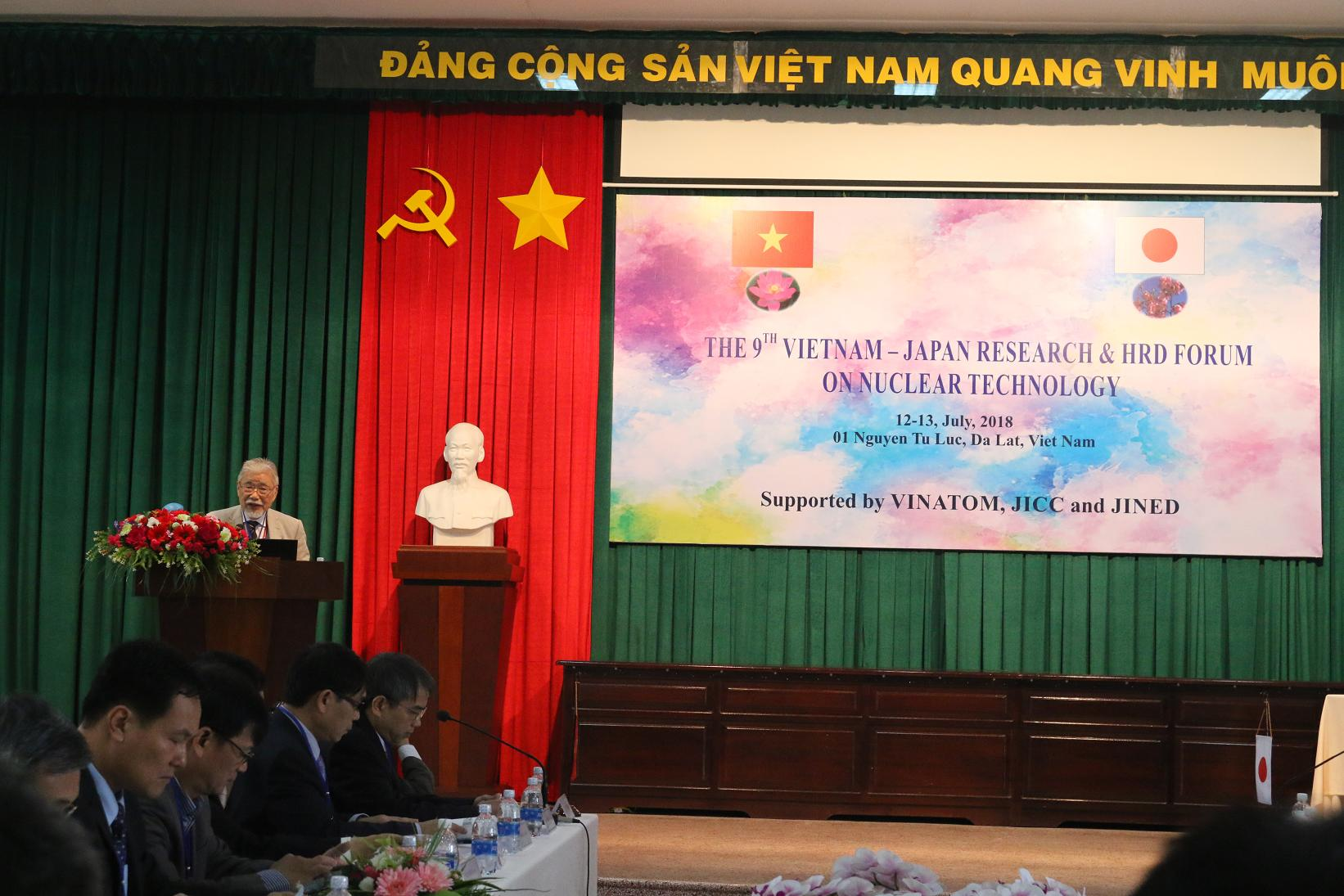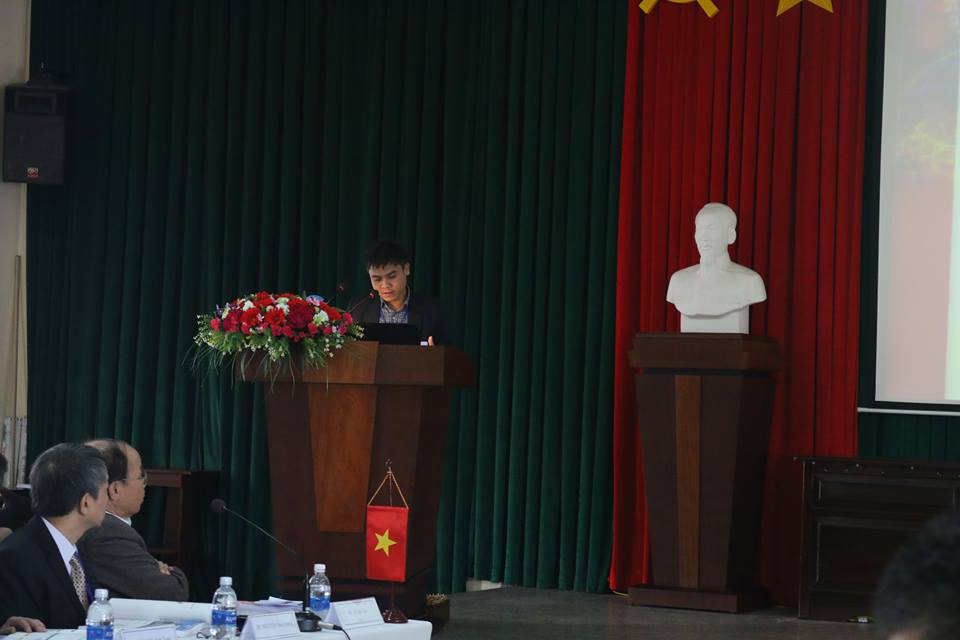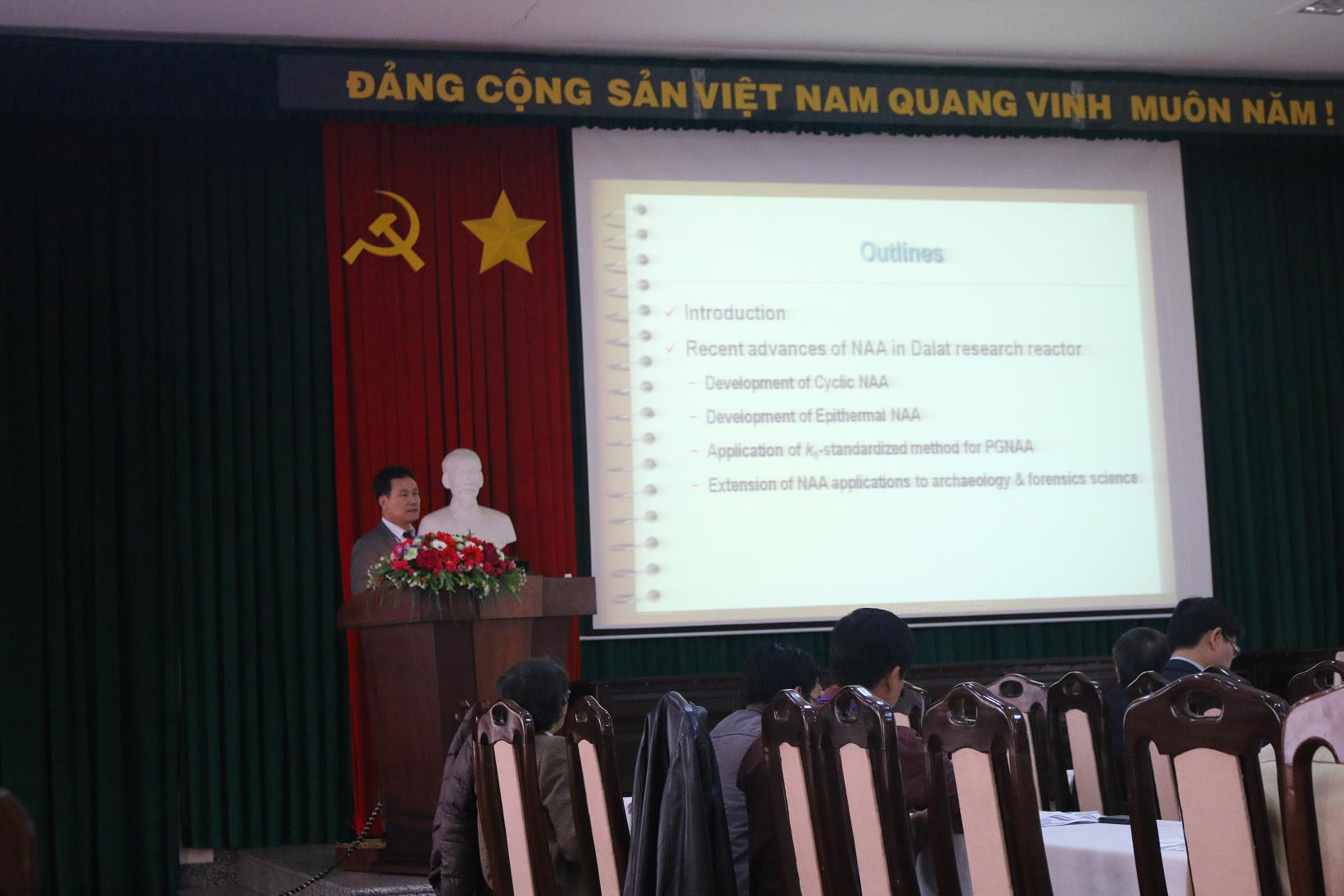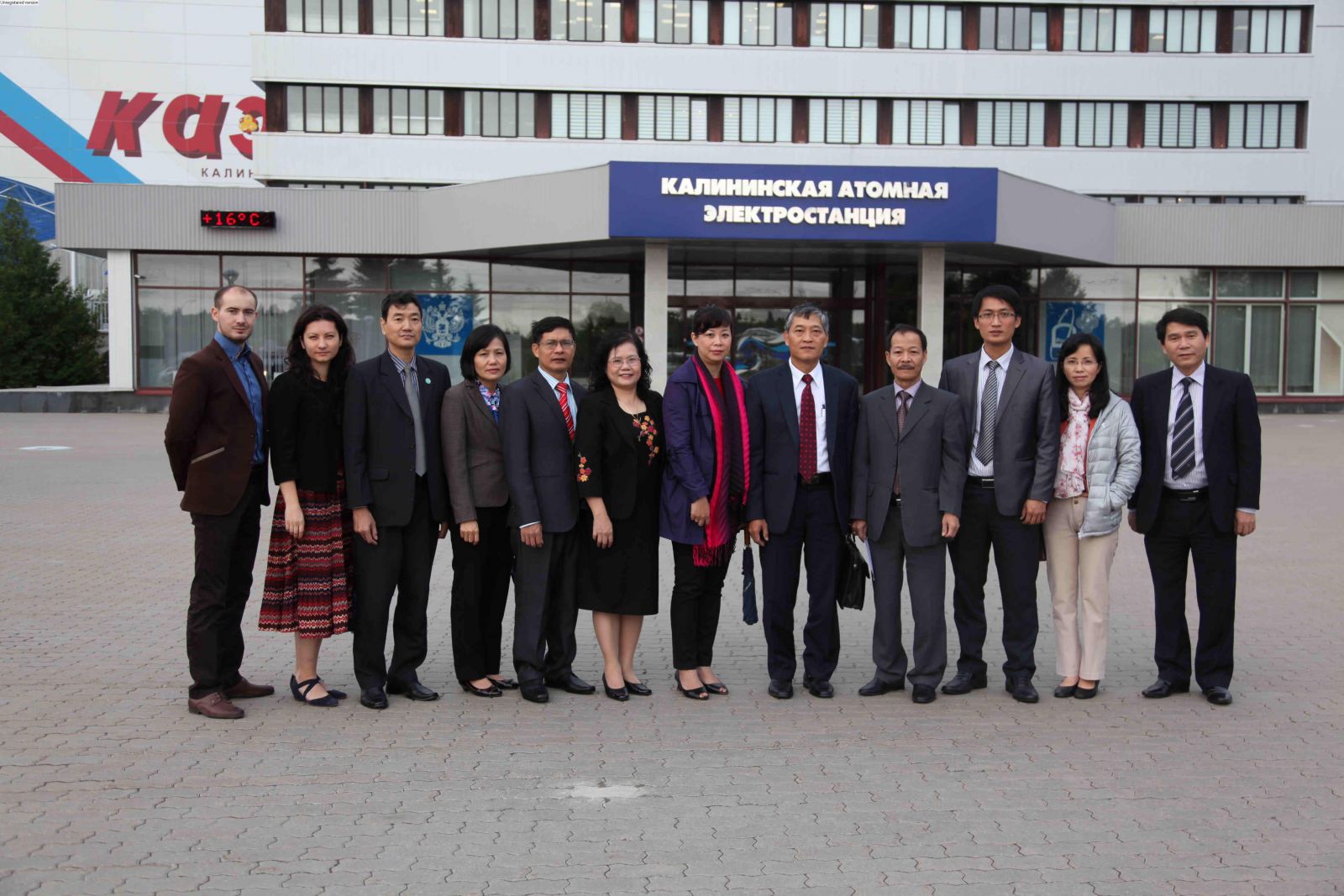From 12th to 13th July 2018, Nuclear Training Center (NTC), Vietnam Atomic Energy Institute (VINATOM) in collaboration with JAIF International Cooperation Center (JICC) and the International Nuclear Energy Development of Japan Co., Ltd (JINED) organized the 9th Vietnam-Japan Forum on Research and Development of Human Resources for Nuclear Technology at Nuclear Research Institute (NRI), Dalat.

The participants at the 9th Forum
This Forum honorably welcomed 40 participants including Dr. NGUYEN Hao Quang, Vice – President of VINATOM; leaders and researchers from NRI, NTC, Center for Nuclear Techniques, Vietnam Atomic Energy Agency (VAEA) and Dalat University.
The 25 – person delegation from Japan included Emeritus Prof. Masaki SAITO, Tokyo Institute of Technology; Mr. Takehiro Tsuchiya, Counselor at Embassy of Japan, and representatives from Chubu Electric Power Company, Nagaoka University of Technology, Kyoto University, Kindai University, Japan Atomic Energy Agency, Mitsubishi, Hitachi, Toshiba, JICC and JINED.
At the opening ceremony, Dr. Nguyen Hao Quang, Vice President of VINATOM welcomed all delegates attending this forum which focused on “Current status, trends and design of research reactors”. He emphasized the critical role of research reactors in the national nuclear energy programme for peaceful purposes in each country. At present time, there is only one research reactor with power of 500 kW, located at NRI, Dalat. Nevertheless, this reactor has been operated for more than 30 years, causing the limitation in exploiting it from now on. As a result, it is necessary to build a new multipurpose and high power research reactor in the near future.

Dr. Nguyen Hao Quang, Vice President of VINATOM welcomed the delegates attending this forum
Next, Emeritus Prof. Maski Saito from Tokyo Institute of Technology gave the audience a brief review of previous nine Forums as follows.
- Forum I: Topic “Thermal Hydraulics and Heat Transfer”, Venue at Hanoi University of Science and Technology (HUST), 23-24, 2013, 100 participants.
- Forum II: Topic “Materials for LWRs”, Venue at HUST, Hanoi, June 5-6, 2014, 120 participants.
- Forum III: Topic “Research Reactor and HRD by Research Reactor”, Venue at NRI, Nov. 27-28, 2014, 80 participants.
- Forum IV: Topic “HRD for Top Management”, Venue at NTC, Hanoi, Nov. 27-28, 2015, 80 participants.
- Forum V: Topic “Current Technology and Research Topics on Non-destructive Examination and Diagnosis, Aging Degradation of the Nuclear Power Plant”, Venue at NTC, Hanoi, Nov. 26-27, 2015, 90 participants.
- Forum VI: Topic “Electric and Instrumentation for Control of the Nuclear Power Plant”, Venue at NRI, May 19-20, 2016, 100 participants.
- Forum VII: Topic “Current Situation of Fukushima Nuclear Accident”, Venue at HUST, Hanoi, Nov. 24-25, 2016, 90 participants.
- Forum VIII: Topic “Monitoring System”, Venue at NTC, Hanoi, Dec. 7-8, 2017, 80 participants.
- Forum IX: Topic “Research Reactor”, Venue at NRI, Jul. 12-13, 2018, 60 participants.
As 6 years went by with substantial changes and challenges, Prof. Masaki Saito expressed his contentment with the cooperation between two sides in the field of atomic energy. He highly appreciated the strong efforts of all organizations, experts, and others who got actively involved and made contribution to the success of the Forum.

Prof. Masaki Saito from Tokyo Institute of Technology at the Forum
The 9th Forum comprised 8 oral presentations by Vietnam and 10 oral presentations by Japan.
The 1st session encompassed much concerned issues such as current status of nuclear power in Japan. Accordingly, prior to the accident at the Fukushima Daiichi Nuclear Power Station (NPS), 54 units were in service in Japan. Thereafter all were shut down and, since then, decisions were made to decommission 18 of them (including the six at Fukushima Daiichi). 9 units which are PWRs are operating now and 33 units are available to be operated. Decommissioning of Fukushima Daiichi NPS is under way according to the Mid-and-Long-Term Roadmap. All spent fuel rods has been removed from the Spent Fuel Pool of Unit 4. The next target is removal of spent fuel rods from Units 3. Preparatory work of removal operations at Unit 3 which are expected to be launched in this July is ongoing.
The biggest challenge for Japanese electric companies to meet the new standards of power plants is the cost of upgrading their safety equipment. In fact, these companies are in the process of preparing appraisals, in which the economic efficiency, between investment costs and gains, is essential to be taken into account. Consequently, some plants have been forced to be decommissioned due to their deficit. At present, much more stringent safety regulations are put into practice in Japan, thus, Japanese power companies are to face challenges to meet the new requirements in the current context.

Representative of NRI presented about typical results of environmental radioactivity research and monitoring in Vietnam
Subsequently, the representative of NRI presented about typical results of environmental radioactivity research and monitoring in Vietnam, which gave further insights into the spatial distribution of nuclear test deposition in the East Asia region. Also, the lessons drawn from the presented results were mentioned, such as training on monitoring and research to guarantee monitoring quality, data interpretation and publications, synchronous setup of facilities and equipment for all the stations in national network, compulsory and standard operating procedures and establishment of online monitoring of some constituents.
In his speech at the Forum, Dr. Hoang Anh Tuan, Director of VAEA delivered some remarks on education and training using research and reactor. He introduced the publication “Experimental and Calculational Works on Characteristics of THE DALAT NUCLEAR RESEARCH REACTOR (DNRR)” by VAEA and VINATOM. It consisted of 26 typical papers representing the most important experimental and calculation results of the DNRR physics and engineering obtained during 30 years of operation and exploitation. He put an emphasis on the necessity to review the publication in order to publish a new version in coming years. Furthermore, he strongly wished to establish a Nuclear Knowledge Management (NKM) program for the nuclear institutes according to the IAEA guides to ensure the sustainability for human resource development and to maintain the key persons in this field. The NKM program should be integrated into the review and development activities of research reactor infrastructure, which are expected to be co-organized by Vietnam Agency for Radiation and Nuclear Safety (VARANS), VAEA, VINATOM and IAEA.
The next sessions involved in such topics as experiences in research reactor operation (JRR-3M, DNRR, restart of research reactors at Kyoto University under New Regulation Requirements), research reactor design (main results of design calculation for new research reactor with high power and multi-purposes, development of filtered neutron beams for research and applications at DNRR, application of research reactors JRR-3 including design of silicon doping facility), utilization of research reactor in education, training, medicine and industry.

Dr. Ho Manh Dung, Vice-President of NRI at the closing session
At the closing session, on behalf of each side, Dr. Ho Manh Dung, Vice-President of NRI, and Dr. Kiyonobu Yamashita, Counselor of Japan Embassy summed up the Forum, sent their great thanks to organizer committee and evaluated it as a success. After the Forum, the Japanese delegation was invited to visit the research reactor at NRI.
Vietnam – Japan Forum of Research and Human Resources Development on Nuclear Technology has become a regular event under the framework of international cooperation between Vietnam and Japan since 2013. The Forum is expected to be an interesting destination for those who wish to exchange the latest findings as well as human resource development trends in atomic energy research.
Pham Thi Thu Trang, Education & Training Department




